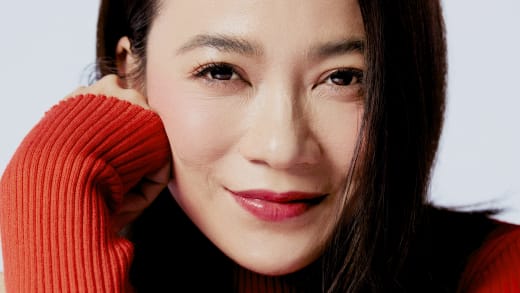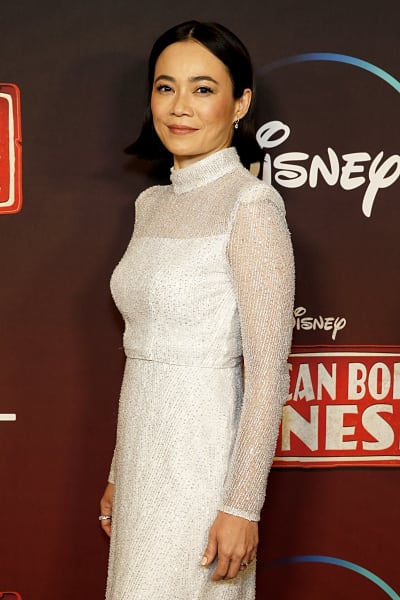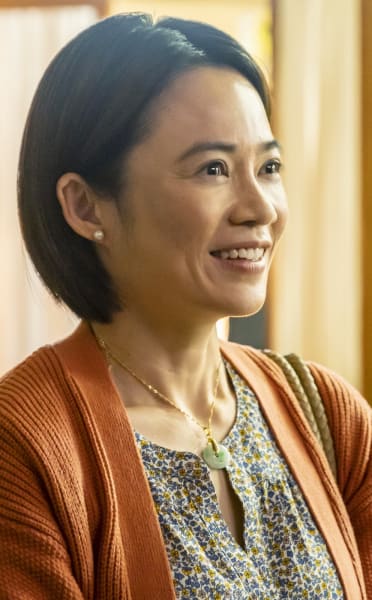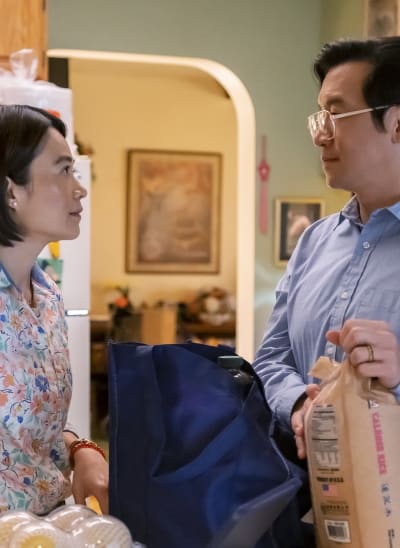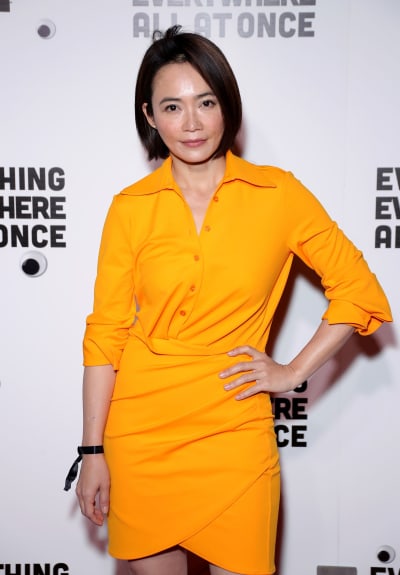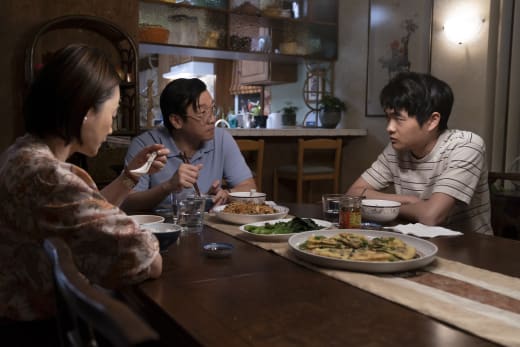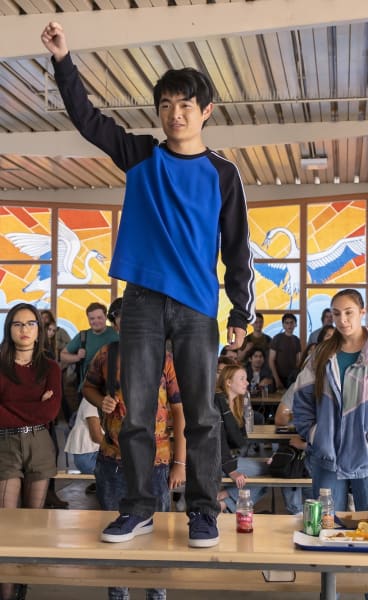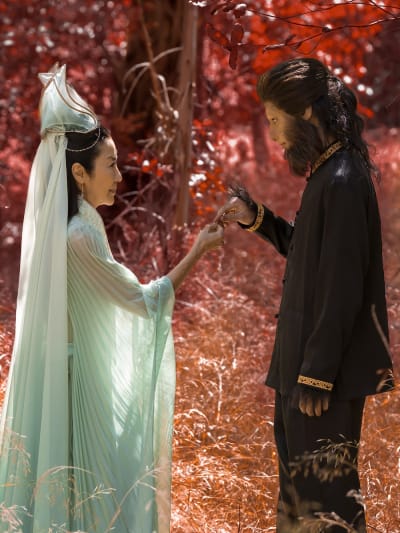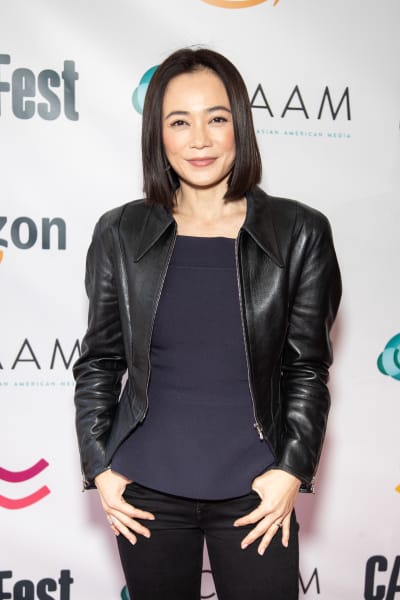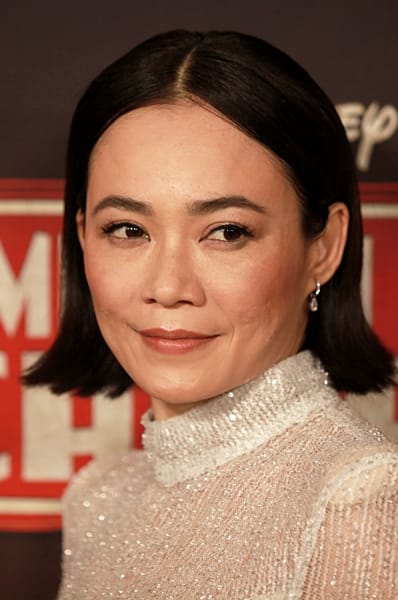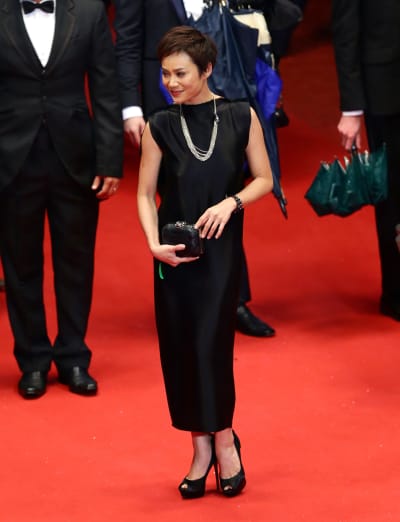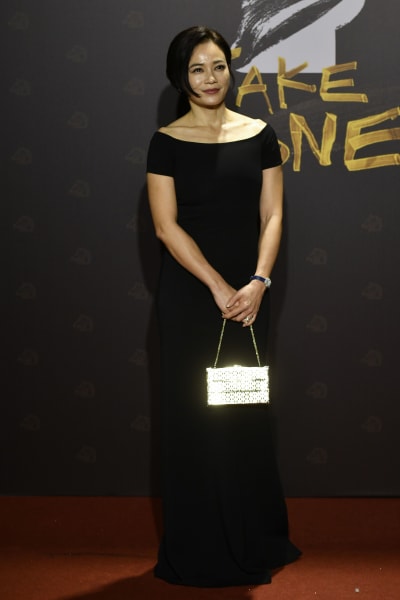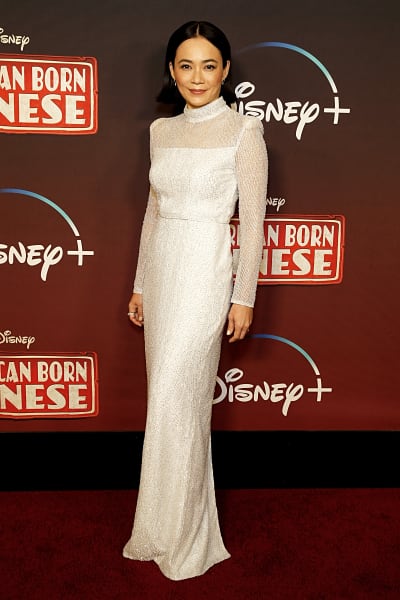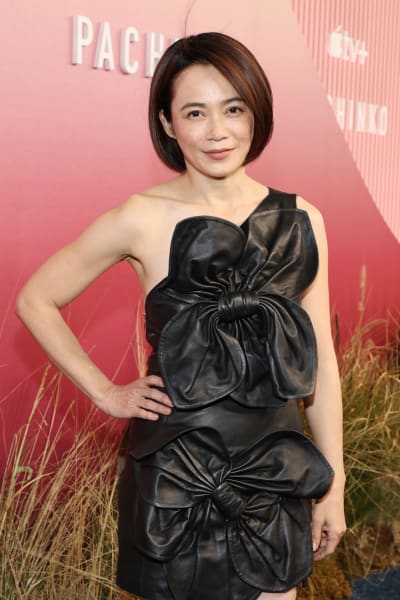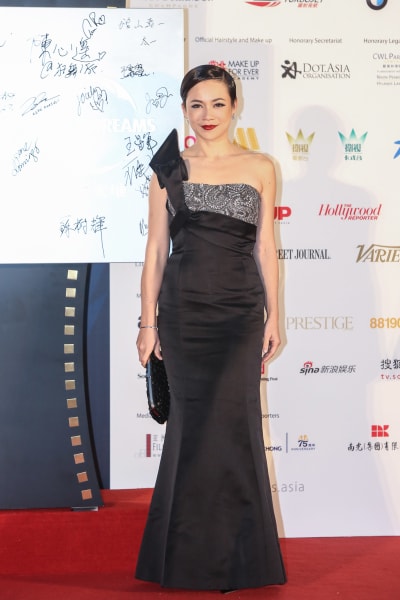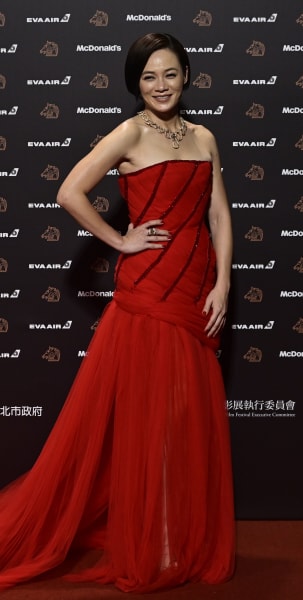While she may not yet be a household name, Yeo Yann Yann is giving viewers a lot to talk about lately with her powerful and inspired portrayal of Christine Wang on Disney+’s American Born Chinese.
Based in Singapore, the Malaysian-born actress has worked all over the world in many different languages. Her devotion to her craft is apparent in the authenticity she brings to her roles.
Following the recent news of her nomination for Best Supporting Actress in a Streaming Comedy Series by the Hollywood Critics Association for her part on American Born Chinese, we bring you this exclusive interview with the eloquent and passionate woman.
As Christine Wang, Yeo portrays a strong-willed but loving mother who defends her son’s well-being in the earthly realm while he fights otherworldly battles, unbeknownst to her.
While her parental relationship with Jin (Ben Wang) is central to the show’s family theme, the bond between Christine and her husband, Simon (Chin Han), is equally essential.
Speaking with TV Fanatic via Zoom from her home in Singapore, Yeo tells us what drew her to the role.
“Before I was approached with the script, I had never read the graphic novel. But the first scene I read was the scene on the first episode with Jin. We’re in a very cool shop, buying clothing for him.
“And in that first scene, I already fell in love with Christine. She’s someone that I’ve barely seen in the representation of Asian moms in Western media.
“Whenever Asian moms are depicted, they’re a little bit more impatient and unhappy with their sons’ different choices. But from that scene, I can see her trying very hard to understand Jin, and Jin is also trying to let his mom understand what he’s thinking.
“But these two obviously grew up in different cultures. They are trying so hard, but they just can’t reach each other. They were so kind to each other. They are so sweet to each other. I just fell in love with her in that short scene.”
“After that, of course, I went on to read American Born Chinese, the graphic novel, and I realized Christine wasn’t in the book that much.
“I took the liberty to really spin off from how I imagined her being. And when I started working with Chin Han, who plays Simon in the series, we had even more imagination together and a lot of creative sparks to get started when we met in LA.
Yeo explains that she and Chin Han spent a lot of time fleshing out the relationship between Christine and Simon.
“We were very lucky. We had time. We had about two weeks’ time. I’d known of Chin Han for a long time because he’s originally from Singapore.
“I watched his performances in his films and TV series, but I had never worked with him. I was very nervous when I arrived in LA, and I texted him, ‘Would you have time to have coffee with me so we could discuss Simon and Christine?’
“I was so happy that he was so open to meeting with me and had a lot of thoughts about Simon and the relationship between Simon and Christine. Because it was very lightly depicted in the graphic novel, we actually had a lot more space to take our own liberties to create.”
What did they discover about Christine and Simon during that time?
“The writers — and I mean the showrunner, Kelvin Yu, he was leading the group of writers — and also the book itself by Gene Luen Yang, already created a great [space] for us to create.
“[We discussed] how much courage they have when they decided to come over to America and migrate. Courage — that my own generation possibly wouldn’t have — like Christine and Simon to leave so much in their birth country and decide to go to a foreign place and start all over again.
“They wanted a better, brighter future for themselves, for their children. The discussions actually went deep, like how they met each other. In the book, they actually went to study together.
“And then how they started dating, and we had to agree on some big events that happened in their life like how the proposal came on to how did they date, what kind of karaoke they sang, what songs.
“Actually, Chin Han reminded me that on the first day of discussion, I sent him a whole song list of what they listened to when they were dating. I’d totally forgotten about this. There was a lot of Luo Dayou (Lo Ta-yu). [laughs] So we have music for how they met, how they dated. We would discuss how did they have sweet times.
“Sometimes he would say, “Oh, maybe we should have a hug.’ And I said, ‘No, there’s children in the house! Come on, what are you talking about? It’s impossible to have a hug. Even touching fingers might be a big thing in this house.’ We’d just throw ideas at each other like this. It was fun.”
With all the work Yeo and Chin Han put into the Christine-Simon relationship, how did Ben Wang fit into the family dynamic? (Fun fact: Ben Wang’s first IMDB credit was on MacGyver Season 5 Episode 4.)
“Well, you know what? Ben is a genius. We just went on set and did it. He was so busy because he had so many scenes ahead of us and had already started working.
“I think the first time I met Ben, we were doing a chemistry read together, and there were no discussions during the chemistry read. I still remember embarrassing myself by saying, “Oh, you’re so cute! How old are you?” He was like, “Uh, I’m twenty-three.”
“He’s a great actor. He’s able to go back to when he was fifteen, and he did a great job, and the emotional nuances that we have seen on screen are just incredible. Just such a talented actor.”
Christine’s story on American Born Chinese is very much the mortal and human side of Jin’s adventure, focused on the everyday business of family and adolescence.
How does Yeo see this reflected in the supernatural plot involving the Chinese pantheon of gods and goddesses portrayed by stars like Michelle Yeoh and Daniel Wu?
“My biggest take of that is that [like the novel] Journey to the West is a great classic from the 16th century; it’s never about the devil and the gods. It’s always about the human. It’s really a reflection. If, at that time, the original writer, Wu Cheng’en, had written a human story, he could’ve been killed for the wrong political reason.
“So it’s always about a human and the trials that Sun Wukong had to go through. The whole journey to the West — the eighty-one trials that they had to go through — is really reflected in human life. Aren’t all of us going through our eighty-one trials all the time? Aren’t we all looking for our scriptures?
“It shows how a classic can reflect our life, how classics become called classics. [They] never grow old.”
If you aren’t familiar with Journey to the West, the story involves a quest for sacred texts undertaken by one mortal chosen by a god who is aided and obstructed by various supernatural beings, including the Monkey King (also known as Sun Wukong). The parallels to American Born Chinese are apparent.
And just as Journey to the West has influenced centuries of thought, religion, and philosophy, Disney+’s American Born Chinese has already affected the social fabric of its viewers.
Yeo shares a story that illustrates that effect, “We were walking, and there was this lady behind Ben, calling him, ‘Excuse me, excuse me….’
“We turn around, and there’s this lady, and she said, ‘I don’t want to sound weird, but are you the guy in American Born Chinese? Are you the actor?’ And I said, ‘Yes! He’s our Number One! That’s Ben Wang, who is playing Jin Wang!’
“With teary eyes, she said, ‘Y’know, I really want to thank you for doing this show. I love it so much. My son is so touched by the show, and it inspires him a lot. We wanted to binge-watch, but it was getting too late. We’re going to watch it today.’
“Then Ben said, ‘Where’s your son? Would you like to call him and ask him to come out?’ We were just right outside her house. She called her son. Her son came out, and he said, ‘Is that you? Is that you?’ And they started talking. He’s eleven years old.
“While Ben and he were talking, Mom pulled me aside and had a chat with me. She said, ‘He’s very bullied in school. Just yesterday, someone in school asked him to go kill himself.’ Y’know, that whole chat, all of us were teary. Mom said, ‘Thank everybody because it hits home for him.’
“Then the boy, at the end, said, ‘This is a show that you don’t binge-watch and then go forget about it. It leaves you with a thought.’ That’s his original words: It leaves you with a thought.
“They’re from Romania. She’s a Romanian immigrant. First generation. And he’s second generation. So this story: it’s not just hitting Asian viewers. It is about someone feeling out of place. We really wanted to tell a story of this boy named Jin, but it’s [not just] about his story. It’s a universal story.
“I feel so glad that I’m a part of it. I feel so lucky that I’m able to touch people’s hearts with a show that I think is warm. The key is there is a lot of love in it.”
On American Born Chinese Season 1 Episode 7, “Beyond Repair,” an altercation at school brings Simon and Christine to the principal’s office to discuss Jin.
As Principal Finney, Jennifer Irwin (The Goldbergs) is in the unfortunate position of portraying an administrator who is both incredibly ignorant and sanctimonious. Her treatment of the Wangs is textbook bureaucratic racism and white-splaining. It’s an uncomfortable scene to watch. Yeo concurs that it was challenging to perform.
“When I read the scene, it was already a difficult scene to tackle. It’s very emotional. It was. There were so many takes that had tears in my eyes. But I think our director, Erin O’Malley, she’s brilliant.
“She took away the tears. It is a mother talking to someone who is talking down to her son. It’s just a mother defending her son, so it came down to that. It did not go into melodramatic.
“The tears had already dried up after the first few takes, I think. We went down to what is factual. The fact is, ‘What you’re talking about? This is my son that I’m defending. I don’t understand what you’re talking about. I seriously don’t.’ This is from my perspective.
“Then, when Simon starts chipping in and saying those words when they’re really facing all these problems at home, it was difficult to hear him admit that there’s some problem with the family. [Culturally speaking,] we don’t share [family stuff] with anyone.”
Yeo has a wide range of experiences working in film and television globally. What has she noticed about how productions diverge and dovetail in the different locales?
“I’m lucky enough to have been able to have a chance to work in Singapore, Malaysia, Taiwan, India, England, US…
“The biggest difference between the Western and Eastern countries is that we have a five-day week in the Western countries, whereas when you’re in Asia, there is no five-day week. No such thing. Just straight through, or you have eight, nine days, and then one turnover. It is quite [exhausting].
“But there is one similarity that I observed. Passion. The passion to tell great stories. No difference. Everyone wants to do their best as part of the film or production.
“Everyone wants to do their best, and only when they do that… It was this that makes me love what I do. Wherever I go, people are full of passion about doing their best and telling the greatest stories.”
Yeo’s love of languages and skill at learning them comes partly from being immersed in a multilingual culture from her formative days.
“Growing up in Malaysia, I have to grow up with three different languages. I primarily speak Mandarin, and then I learned Malay, my national language, as a language class in school, English as a language class in school, and Mandarin as a language class in school.
“I learn everything in Mandarin, so I can’t help my daughter with her studies. [laughs] But at home, we would speak the Hokkien language because I’m of Fujien descent.”
“Because I really like Hong Kong films, I started learning Cantonese. I speak it almost every day after that because when I went to work in Malaysia, in Kuala Lumpur, they spoke Cantonese. So I started speaking Cantonese. Then because of my interest in language, I started learning some Hakka.
“While I was in LA, I know that many first-generation [Chinese] actually came from Toisan. The Toisan language is very close to Cantonese and Hakka, so I kind of picked it up. I’m very glad my costumer, Sally Woo, speaks really good Toisan, and she was teaching me. I was like, ‘Oh my god, I’m so lucky! I have all these experts around me.’
“My real interest is my love with language. Hindi is, of course, one of the biggest challenges that I’ve taken up as an actor (for the series Modern Love: Mumbai). Thanks – but no thanks – to the COVID, I had six months of time to work on it.
“And I had two coaches to work with me, and I had about eighty percent of my lines in Hindi. If you have the chance, you can go to Amazon Prime and watch it.
“I went [to Mumbai] during the peak of COVID. Kind of crazy. They climbed off the peak, and finally, India opened the country’s doors to people to come in, and I took the first flight to Mumbai. Two days later, Omicron arrived in Mumbai!
“But it was a great experience, working in a different culture. There was a different way of working, but there’s no difference between the skill and the passion. I just love them all.”
What sort of role would Yeo like to take on next?
“That’s a tough question. I love characters that touch people’s hearts. I’ve been playing mothers. There are many facets of me that I haven’t explored, so I would like to try and see what other facets I could express in the creative world.
“Maybe some larger-than-life characters. Maybe I could do a character like Ursula in The Little Mermaid (as played by Melissa McCarthy) as a recent example. A character like that, a larger-than-life character that I think I would enjoy playing and also have fun with it.”
Having done extensive work on both television and films — her next big release is expected to be Netflix’s Havoc, starring Tom Hardy and Forest Whitaker — does Yeo have a preference?
“No, I [actually] started from theater. I enjoy all different media. They have different types of satisfaction.
“I think, for me, theater is very direct. You get your audience feedback [immediately]. And, to me, TV is like your neighbor. You know what they eat. You know what happened today. You know what time they come back from school, what time they come home, what time they leave home.
“For films, it’s more like a distant cousin that you love. You don’t see each other so much, but when you see them, you love them, you stick with them, and then when they leave, you’re just, ‘Ah, I remember this person. We can have a text sometimes.’
“And when they see you again, you’ll be so happy. It’s a different kind of relationship with films and TV.”
Whether it’s on neighborly TV productions or riding the emotional rollercoaster of film projects, Yeo Yann Yann always brings a genuine warmth and humanity to her roles.
What do you think a potential second season of American Born Chinese will hold in store for Christine and Simon? Are you ready to see Yeo take on the hinted-at rough-and-tumble action of Havoc?
Hit our comments with your thoughts, Fanatics! Let’s talk!
Diana Keng is a staff writer for TV Fanatic. She is a lifelong fan of smart sci-fi and fantasy media, an upstanding citizen of the United Federation of Planets, and a supporter of AFC Richmond ’til she dies. Her guilty pleasures include female-led procedurals, old-school sitcoms, and Bluey. She teaches, knits, and dreams big. Follow her on Twitter.
